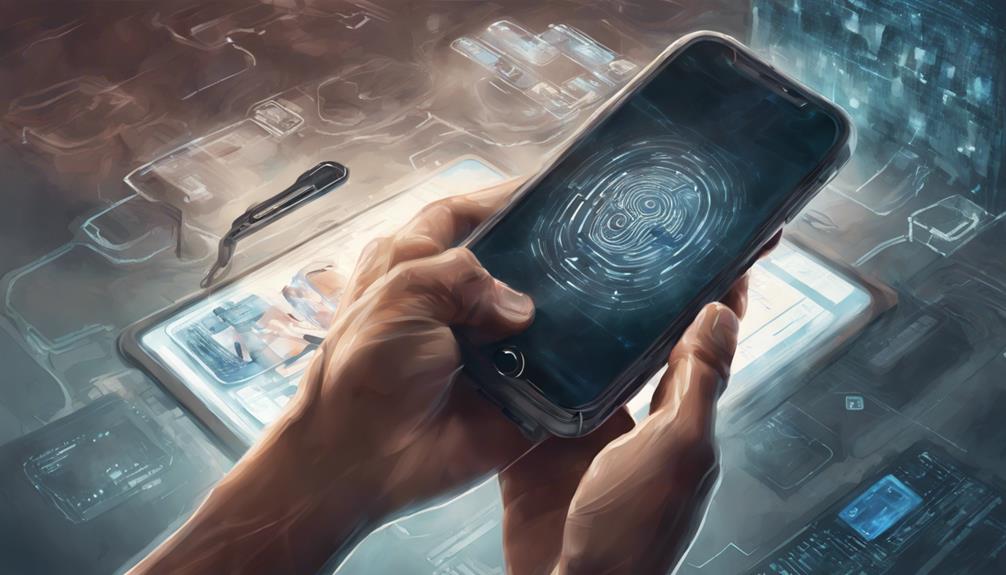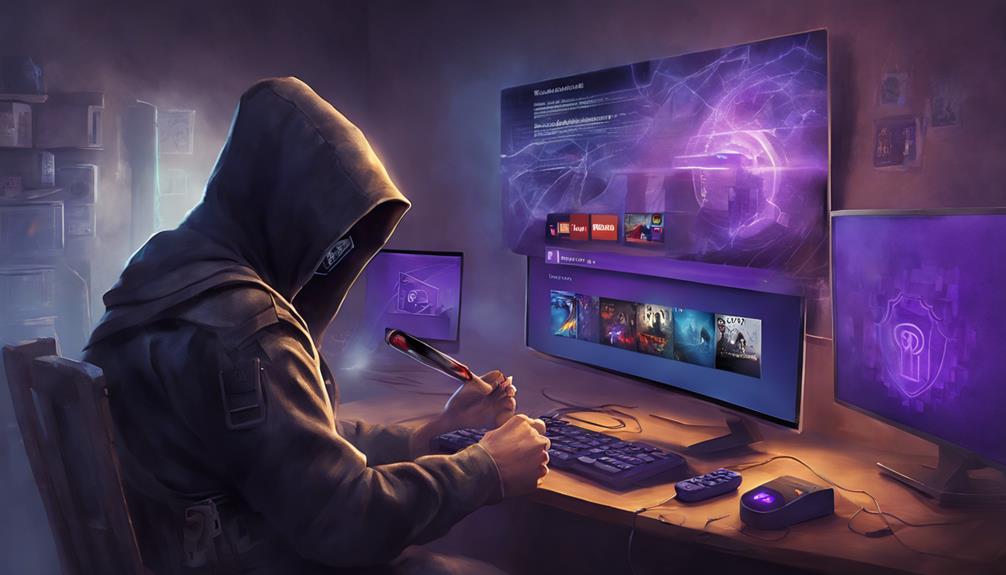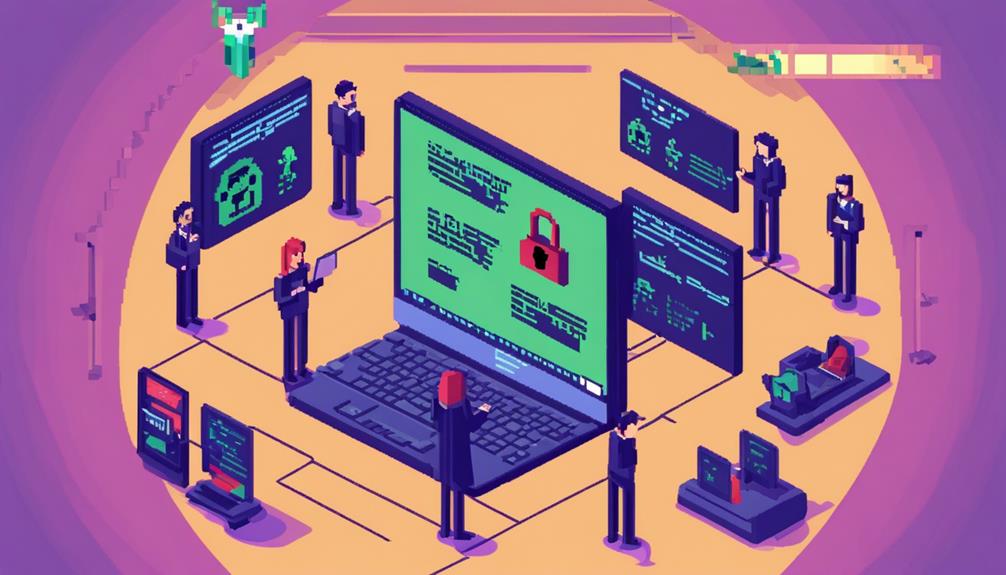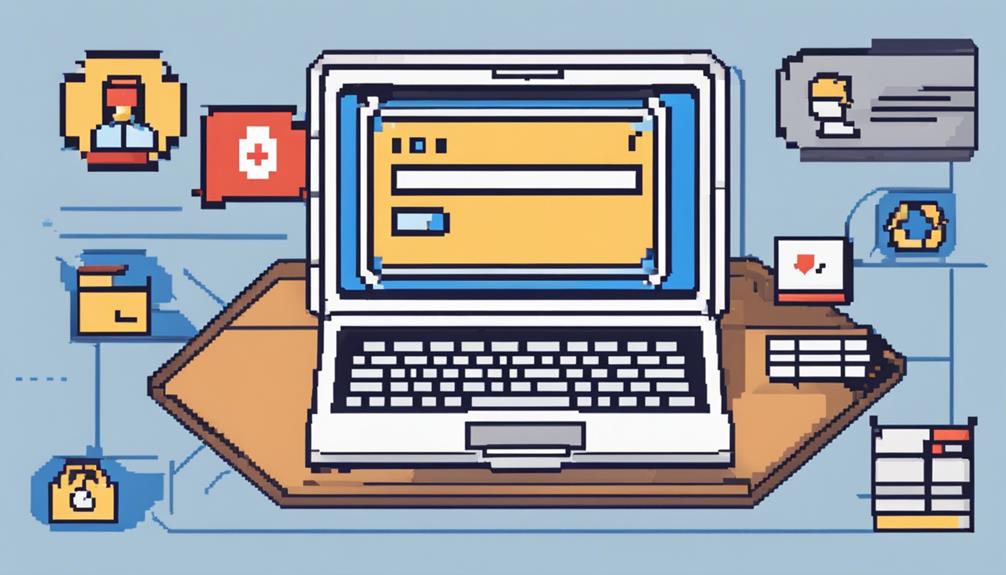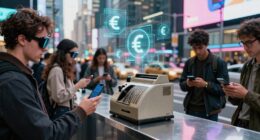To safeguard your iPhone from hackers, make sure two-factor authentication is enabled, use strong, unique passwords, and keep iOS updated for security patches. Avoid clicking on suspicious links or emails and exercise caution when using public Wi-Fi by utilizing VPN services. Utilize Find My iPhone feature for tracking and remote data wipe capability. Disable automatic Wi-Fi connections, manually select secure networks, and maintain regular backups for data protection. Implementing these security measures enhances device safety against cyber threats.
Key Takeaways
- Enable two-factor authentication for added security.
- Use strong, unique passwords and a password manager.
- Keep iOS updated to patch security vulnerabilities.
- Avoid suspicious links and emails to prevent phishing.
- Use VPN on public Wi-Fi and prioritize secure browsing.
Enable Two-Factor Authentication
Enabling two-factor authentication on your iPhone enhances its security by requiring an additional verification step beyond just your password. This feature, offered by Apple for protection of your Apple ID and iCloud account, adds an extra layer of security to prevent unauthorized access to your personal data.
By utilizing two-factor authentication, you can greatly reduce the risk of hackers gaining entry to sensitive information stored on your iPhone.
This security measure is vital in safeguarding your personal data, as it acts as a barrier even if your password is compromised. Hackers trying to access your iPhone will be thwarted by the additional verification step required by two-factor authentication.
It is highly recommended to activate this security feature to fortify the protection of your iPhone and prevent potential breaches from threatening the privacy of your personal information.
Keep Ios Updated
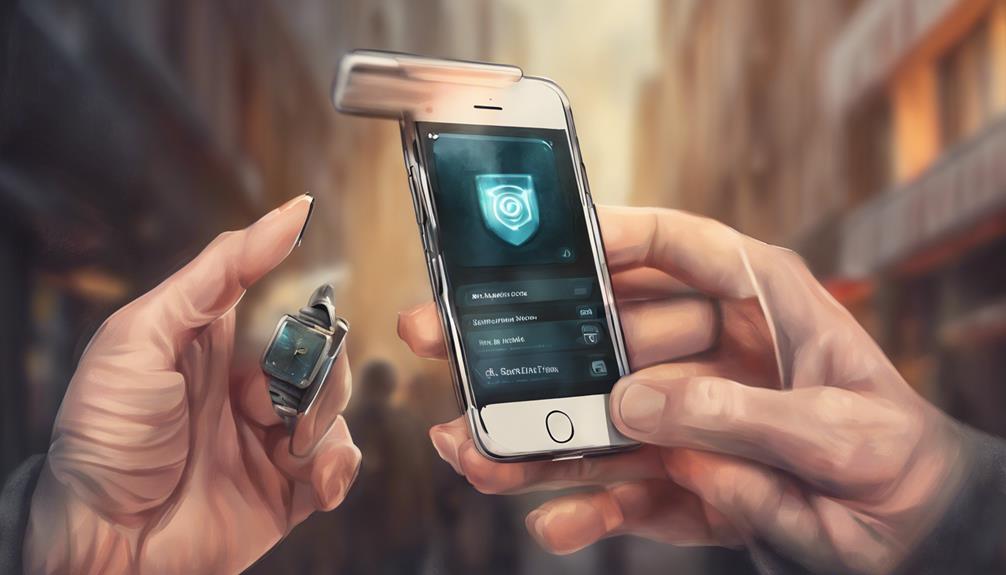
Regularly updating your iOS system is vital to strengthen the security of your iPhone against potential cyber threats. Apple releases security patches and fixes for vulnerabilities that hackers could exploit, making it important to keep your device up to date.
Outdated iOS versions are more susceptible to attacks, leaving your data at risk. By updating iOS, you can protect your device from hackers who may attempt to exploit known security flaws to gain unauthorized access to sensitive information.
Apple continually enhances security measures in newer iOS versions, emphasizing the importance of staying current with updates to safeguard your data.
Setting your iPhone to automatically download and install iOS updates can further safeguard your device from potential hacking threats.
To ensure the security of your data and protect your iPhone from cyber threats, maintaining the latest iOS version is essential.
Use Strong Passwords
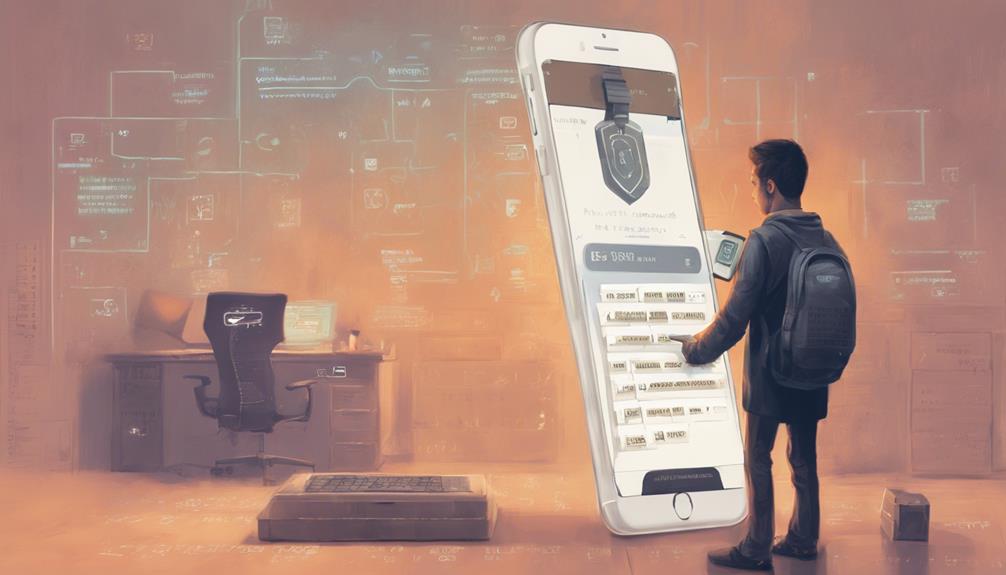
Using strong passwords is crucial for enhancing the security of your iPhone and protecting your personal information from potential hackers. To guarantee maximum security protections, consider the following:
- Create a strong password: Utilize a combination of uppercase and lowercase letters, numbers, and special characters to create a robust and unique password that is difficult for hackers to crack.
- Avoid commonly used passwords: Steer clear of easily guessable passwords like '1234' or 'password,' as these provide little to no security against hacking attempts.
- Enable two-factor authentication: Implementing two-factor authentication adds an extra layer of security by requiring not only a password but also verification codes sent to your device for access.
- Use password managers: Consider using a password manager to generate and store complex passwords for all your accounts, ensuring each one is unique and secure.
Avoid Suspicious Links/Emails
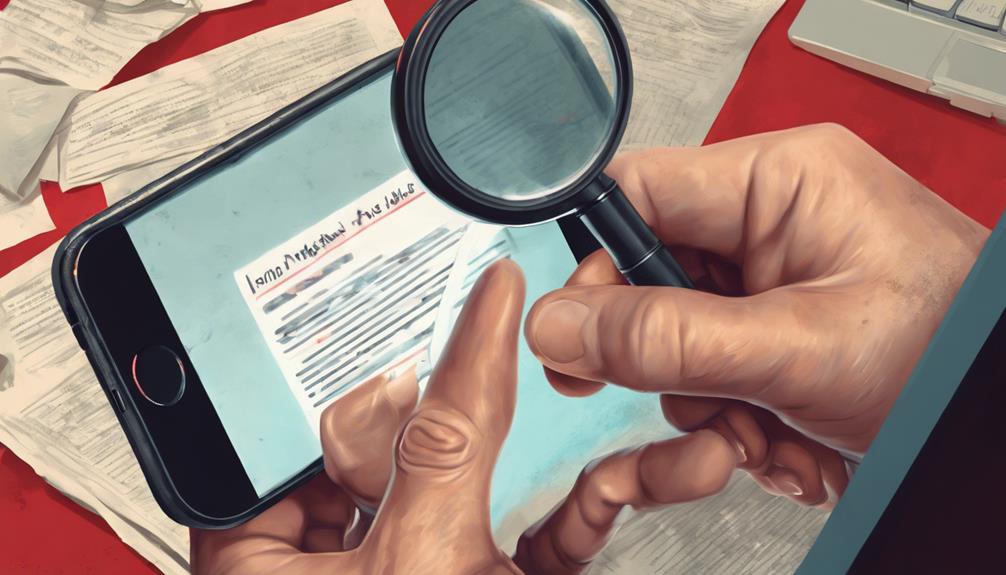
Employing vigilance against suspicious links and emails is vital in safeguarding your iPhone against potential cyber threats. Phishing websites often disguise themselves as legitimate sources to trick users into revealing personal information. Unsolicited emails or texts containing links should be approached with caution, as they may lead to these malicious sites.
It is essential to scrutinize the sender's email address for any irregularities or spelling errors that could indicate a phishing attempt. Avoid clicking on links in emails requesting sensitive data like passwords or account details, even if they seem to be from trusted entities. To verify the legitimacy of links, hover over them to preview the URL before clicking.
When uncertain about the authenticity of a request, it is wise to contact the supposed sender through official channels for clarification. By being cautious and refraining from clicking on suspicious links, you can better protect your iPhone from potential cyber threats.
Be Cautious With Public Wi-Fi

Enhancing your awareness of potential risks is essential when connecting to public Wi-Fi networks to protect your iPhone from cyber threats.
- Public Wi-Fi networks: These networks lack encryption, making them vulnerable to data interception by hackers.
- Data breaches: Avoid accessing sensitive information like online banking while on public Wi-Fi to prevent potential breaches.
- Virtual Private Network (VPN): Use a VPN to establish a secure and encrypted connection, safeguarding your data from hackers on public networks.
- Fake Wi-Fi hotspots: Hackers can create fake hotspots in public places to deceive users into connecting, enabling them to steal personal information and passwords.
To mitigate these risks, it is advisable to disable auto-connect to Wi-Fi networks on your iPhone.
Set Up Face ID/Touch ID
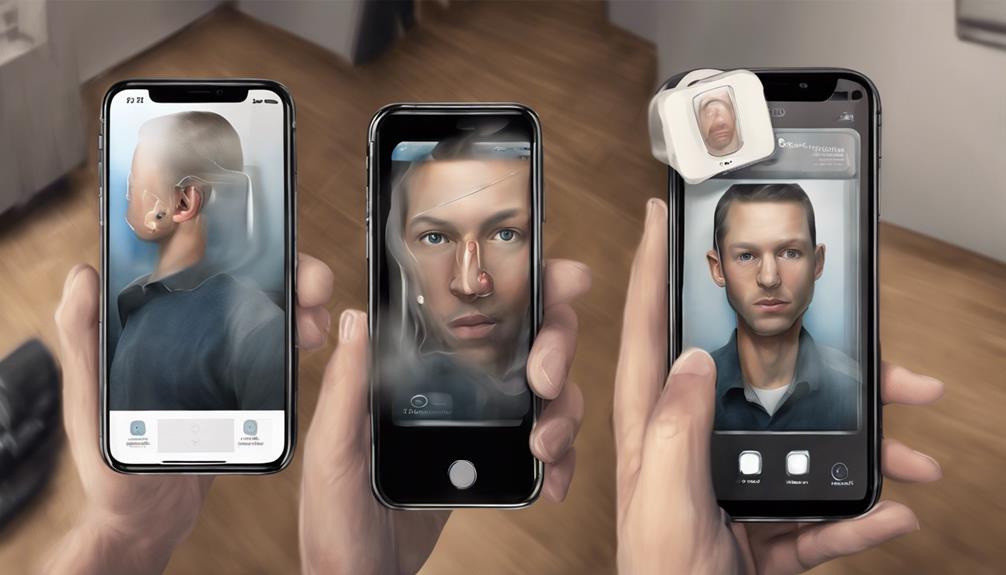
Facilitating secure access to your iPhone, Face ID/Touch ID are advanced biometric authentication features that provide enhanced protection for your device and sensitive information.
Face ID, available on iPhone X and newer models, utilizes infrared technology to create a detailed 3D map of the user's face, ensuring a highly secure and accurate authentication process.
On the other hand, Touch ID, found on older iPhones with a Home button, scans the unique patterns of a person's fingerprint to access the device, offering a convenient and secure method of entry.
Both Face ID and Touch ID add an extra layer of security by restricting device entry to authorized users only, safeguarding against unauthorized access to sensitive data.
By incorporating biometric authentication, these features not only enhance security but also streamline the access process, making it efficient and user-friendly.
Whether through facial recognition or fingerprint scanning, setting up Face ID or Touch ID is a vital step in fortifying your iPhone's security against potential threats.
Turn on Find My Iphone
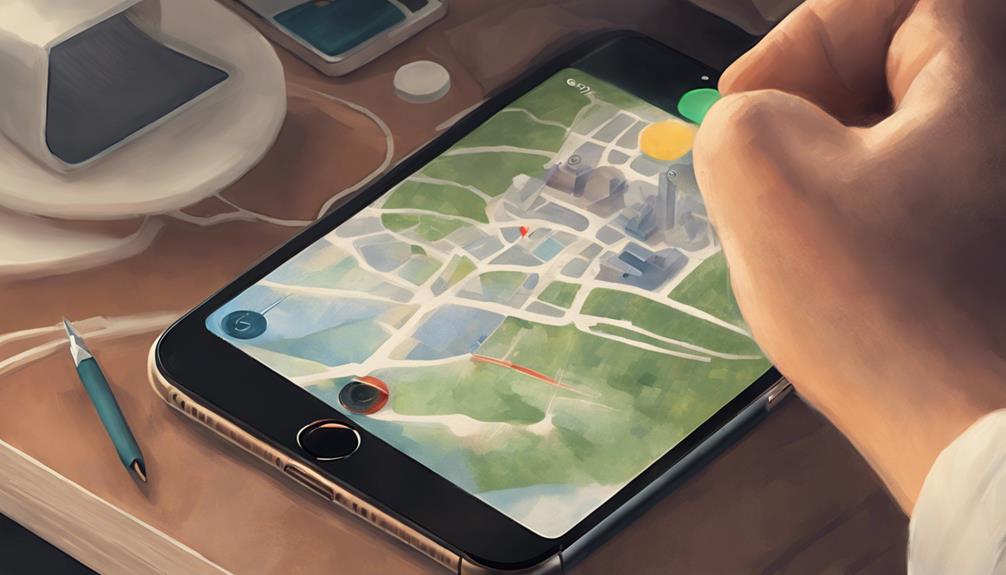
To further bolster your iPhone's security measures beyond biometric authentication, an important step is to enable the Find My iPhone feature. This tool provides essential functions for safeguarding your device and personal data:
- Locate and Track: Find My iPhone allows you to pinpoint the exact location of your device, aiding in its recovery if lost or stolen.
- Remote Lock and Erase: In case of unauthorized access, you can remotely lock your iPhone or even erase all data to prevent sensitive information from falling into the wrong hands.
- Sound Notification: If your iPhone is misplaced nearby, you can use Find My iPhone to play a sound on the device, making it easier to locate.
- Data Security: Activating this feature is vital for enhancing your device security and maintaining control over your personal data, ensuring that it remains protected at all times.
Use a VPN for Secure Browsing
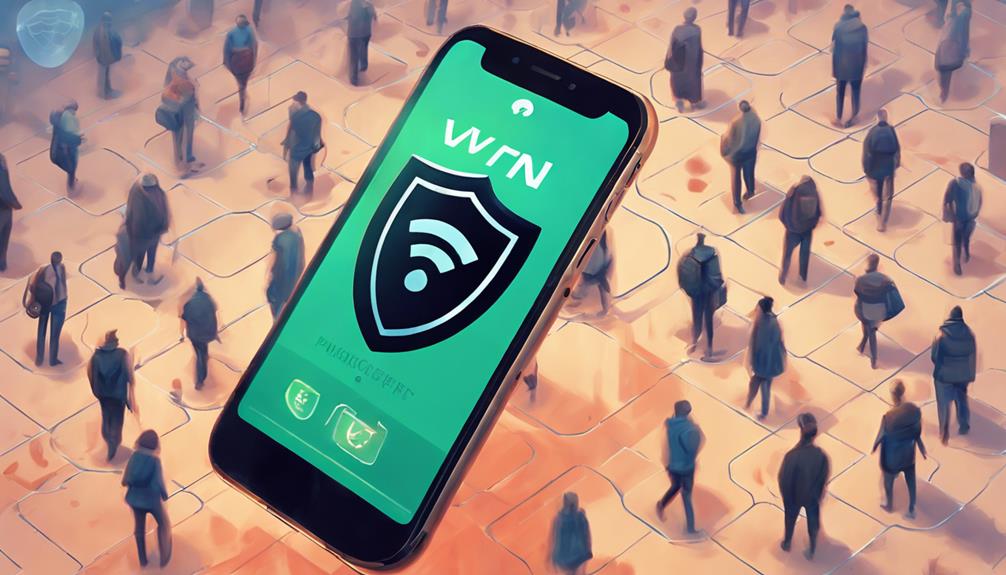
Is your iPhone's online security a top priority? Using a VPN (Virtual Private Network) for secure browsing can greatly enhance your protection against hackers and safeguard your online privacy.
A VPN works by encrypting your internet connection, creating a secure tunnel for your data to travel through. This encryption makes it challenging for hackers to intercept your information, especially when using public Wi-Fi networks.
By using a VPN on your iPhone, you can also mask your IP address, preventing malicious actors from tracking your online activities.
Furthermore, a VPN allows you to access geo-restricted content on your iPhone safely without compromising your privacy or security. Selecting a reputable VPN service is important as it provides an additional layer of defense against cyber threats attempting to access your sensitive information.
Disable Automatic Wi-Fi Connections
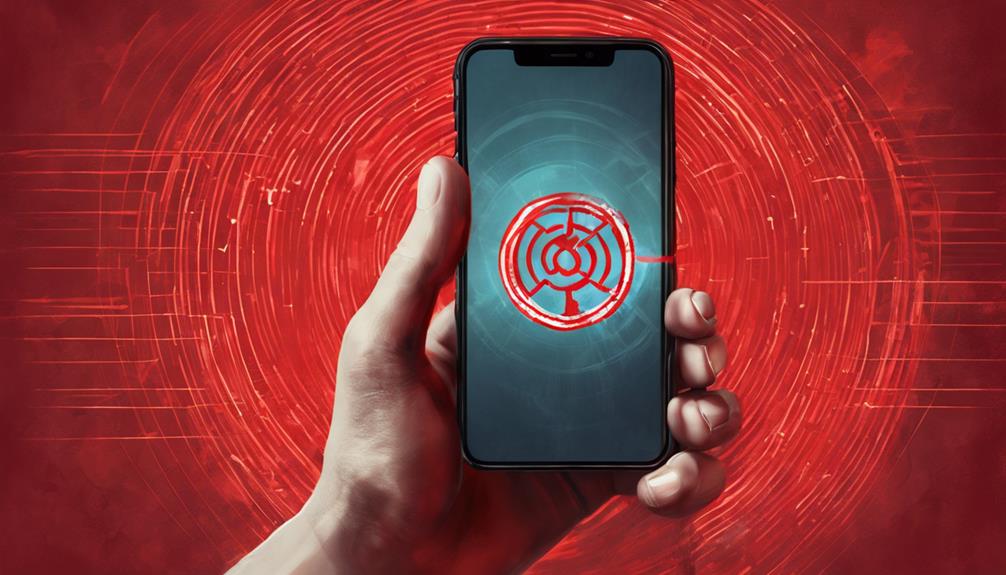
To guarantee the security of your iPhone, it's essential to disable automatic Wi-Fi connections and opt for manual network selection.
By turning off the 'Ask to Join Networks' feature, you can prevent your device from unintentionally connecting to potentially risky networks.
Always verify the security of the Wi-Fi network before connecting to safeguard your personal information from potential hackers.
Wi-Fi Auto-Connect Risks
Disabling automatic Wi-Fi connections on your iPhone is an important step in safeguarding your device against potential hacking risks posed by rogue networks. When you disable auto-connect, you take control of which networks your device connects to, reducing the chances of falling prey to hackers' malicious intentions.
Here are some key points to keep in mind:
- Fake Hotspots: Hackers can create fake Wi-Fi hotspots that mimic legitimate networks, tricking your device into connecting to them automatically.
- Data Theft: These rogue networks are designed to steal your sensitive data, such as passwords, financial information, or personal details.
- Manual Selection: By disabling auto-connect, you can manually choose trusted networks, ensuring a secure connection and minimizing the risk of data interception.
- Security Breaches: Being cautious about connecting to unknown or public Wi-Fi networks and turning off automatic connections can help prevent potential security breaches and protect your personal information.
Taking proactive steps to manage your iPhone's Wi-Fi settings is essential in safeguarding your privacy and data integrity from malicious actors seeking to exploit vulnerabilities.
Manual Network Selection
Enhancing your iPhone's security involves taking control over network selection, specifically by turning off automatic Wi-Fi connections. By disabling automatic connections, you can prevent your device from unknowingly connecting to unsecured networks that may be controlled by hackers. Manually selecting trusted Wi-Fi networks adds an extra layer of security, reducing the risk of unauthorized access to your device and sensitive data.
This proactive step minimizes the chances of falling victim to hacking attempts and protects your personal information from interception. By actively managing network selection, you can safeguard your iPhone against potential security threats posed by unsecured or malicious networks. This practice ensures that your device only connects to known and secure networks, enhancing the overall security posture of your iPhone.
Taking control of your network connections is an essential aspect of protecting your device from unauthorized access and maintaining the confidentiality of your data.
Secure Network Verification
Taking control over your iPhone's network connections by manually verifying and selecting secure Wi-Fi networks is crucial for safeguarding your device against potential hacking threats. By disabling automatic Wi-Fi connections, you can protect your device from connecting to unsecured or malicious networks without your knowledge.
To enhance the security of your iPhone, consider the following:
- Face ID or Touch ID: Utilize biometric authentication methods to add an extra layer of security when connecting to Wi-Fi networks.
- Strong passcode: Set a complex and unique passcode to prevent unauthorized access to your device and network connections.
- Lock Screen: Ensure your device is locked when not in use to prevent unauthorized access and changes to network settings.
- Malicious websites: Be cautious of fake Wi-Fi networks or malicious websites that may attempt to steal your data when connecting to the internet.
Regular Maintenance and Backups

To prioritize the security of your iPhone, it is vital to focus on regular maintenance and backups. By consistently updating your device's software and backing up your data, you create layers of protection against potential hacker threats.
These practices serve as essential preventive measures to safeguard your sensitive information and maintain the integrity of your device.
Secure Data Backups
Regularly backing up your iPhone data is essential in safeguarding against potential data loss due to hacking incidents. When it comes to secure data backups, consider the following key practices:
- Enable automatic backups: Make sure your iPhone is set to automatically back up to iCloud or a secure external device. This guarantees that your data is consistently saved and easily accessible when needed.
- Verify encryption: Ensure that your backups are encrypted to add an extra layer of security against unauthorized access. Encryption helps protect your sensitive information from falling into the wrong hands.
- Strong password protection: Set up a strong encrypted password for your backups. This step is vital in preventing hackers from gaining access to your stored data and maintaining the confidentiality of your information.
- Monitor storage space: Regularly check your backup storage space to confirm you have enough capacity for all your important files and information. Managing your storage effectively helps ensure that all your data is safely backed up and readily available.
Routine Software Updates
Ensuring timely software updates for your iPhone is vital in maintaining its security and protecting it from potential hacking threats. Regularly updating your device's software is essential as updates often include security enhancements, bug fixes, and performance improvements that help keep your iPhone secure. By staying up to date with software patches, you can effectively shield your personal information from cyber threats.
Scheduled software updates can be conveniently set to automatically download and install, making it easier for you to stay protected from potential vulnerabilities. Ignoring these updates can leave your iPhone vulnerable to known security risks that hackers may exploit.
In addition to software updates, it is important to use security features like Face ID or Touch ID and strong passwords to add layers of protection to your device. Moreover, backing up your data regularly ensures that you can restore your information in case of a security breach or data loss due to hacking incidents.
Frequently Asked Questions
How Can I Make Sure My Iphone Is Secure?
Ensuring the security of your iPhone involves implementing proactive measures such as enabling two-factor authentication, updating software regularly, using strong passwords, avoiding suspicious links/apps, and exercising caution on public Wi-Fi networks to safeguard your device from potential threats.
Can You Protect Your Iphone From Hackers?
Protecting your iPhone from hackers is essential. Safeguard it by enabling two-factor authentication, updating software regularly, using strong passwords, avoiding suspicious links/apps, and being cautious on public Wi-Fi. These measures enhance security and deter potential breaches.
What Are the Signs Your Iphone Has Been Hacked?
Signs your iPhone has been hacked may include unexplained data usage, rapid battery drain, strange pop-ups, app crashes, or unfamiliar apps appearing. Stay vigilant for these indicators to protect your device and personal information.
Can Hackers See You Through Your Iphone?
Can hackers see you through your iPhone? Protect your privacy by being vigilant with app permissions. Only download from trusted sources. Regularly review app permissions. If suspicious, disable access and report to Apple immediately.
Conclusion
To sum up, safeguarding your iPhone from hackers requires a combination of proactive measures such as enabling two-factor authentication, using strong passwords, and avoiding suspicious links.
Regular maintenance, updates, and backups are essential to maintaining the security of your device.
By following these steps, you can greatly reduce the risk of falling victim to cyber threats. Remember, prevention is always better than cure when it comes to safeguarding your digital assets.
Stay vigilant and stay safe.
